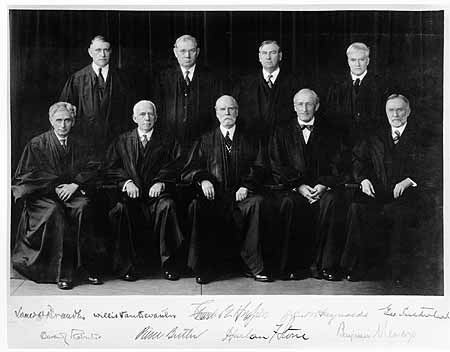It’s easy to amend the Constitution. It’s been done dozens of times since WWII. Send the right case with the right litigants at the right time to an adequately Leftist-leaning Scotus and voila’, amend the Constitution. Pretty slick, eh? Through their silence, this is the end-run around the Constitution that Article V Opponents defend. When did We The People, through Article V, ensconce abortion and homosexual marriage as rights? We The People never empowered the early Administrative State and later the Deep State which threaten our republican existence. Since the 1950s we’ve witnessed the detrimental effects of Christianity’s absence from the public square, especially in our schools. Thank the Scotus for these outrages and much more. Instead of the Article V process, Leftists litigate through select federal courts and eventually get their social justice decisions. In amending the living and breathing Constitution we revert to the practice of our colonial times when similar courts established the limits of the British constitution. “If the Framers had wanted a constitution that evolved by judicial ruling,” said Clarence Thomas, “they could have stuck with the unwritten British constitution that governed the American colonists in just that way for 150 years before the Revolution.”1 Should we wake up one day in a fascist state, rest assured the Scotus facilitated our arrival. Few of the Judges who champion the Left’s unwritten and pretend Constitution matured in surroundings favorable to Constitutional self-government. Instead, their perfect world is ruled by elites, people like themselves, rather than government through representatives of the people and States. Elena Kagan clerked for Thurgood Marshall, who summed his judicially philosophy as, “you do what you think is right and let the law catch up.” Indeed. How very British of him. So, thanks to a foolish 17th Amendment, of which I’ve blogged dozens of times, senators, like congressmen, are congruent with the passions of the people. Passion doesn’t recognize limits, and certainly not the limits of constitutions. I’m not aware of any pre-17th Senate that got anywhere close to confirming judges with anti-Constitutional Marxist backgrounds. But that is where we are and it is what Article V Opponents prefer, where one degree separates the people from judges who amend the Constitution. Yes, Article V opponents perceive our existing system, in which judges amend the Constitution at-will, as less dangerous than the Framers’ filtered Article V process in which the entire nation participates. As opposed to Scotus’ secret workings behind closed doors on carefully crafted Leftist cases, the process under Article V is open. Either two thirds of Congress or the States propose amendments or apply for a COS respectively. At a COS, the States send delegates, not representatives, to propose Amendments. Then, three-fourths of the States must consent to amending the Constitution. This is the way to amend the Constitution in our republic, with the approval of its component members, the people and the States. Assigning this duty to nine secretive lawyers is preposterous and tyrannical. To say the people are too licentious to be trusted with an Article V COS is far too close to the view of our ruling elitists who disdain self-government. One difference between self-government and despotic rule is that the people can correct their mistakes. Banning alcohol under the Eighteenth Amendment was perhaps noble, but proved to be unrealistic; the people repealed it in only fourteen years. Outside of Article V, We the People have no recourse to overturn horrid Scotus decisions. A regular objection from Article V COS opponents concerns the Second Amendment. Many are certain that the Second Amendment is a goner in a theoretical COS when Scotus is the real threat right now to our unalienable rights. Article V Opponents are blind to the Supreme Court as the ultimate danger; it’s a permanent, sitting institution that can amend the Constitution any time its social justice mood directs. There is no sovereign authority in Scotus. Is it even deliberative? We don’t know. Making law isn’t a judicial function, yet these unchecked blackrobes fear no earthly or afterlife punishment for their high crimes. Leftists know their precious “values” don’t rest on the foundation of law, but on the rickety scaffolds of intellectually weak court decisions that only subsequent courts or Article V can reverse. In contrast, an Article V COS is federal, temporary, and rests on the solid foundation of the sovereign people. Not only is it temporary, it is another degree removed from rash, radical, emotional outcomes. It is a purposeful and public process. Instead, Article V Opponents prefer to leave the power with Scotus. An Article V COS isn’t a peril to avoid; it is a blessing to embrace. It is the proper and peaceful means to curb a Scotus that recognizes no limits, not Constitutional limits nor those of God. Just as a body in motion tends to stay in motion, so too will Scotus continue its anti-republican ways until it meets an opposing force, and that force is an Article V COS. 1. Imprimis, Hillsdale College, September 2019. |

